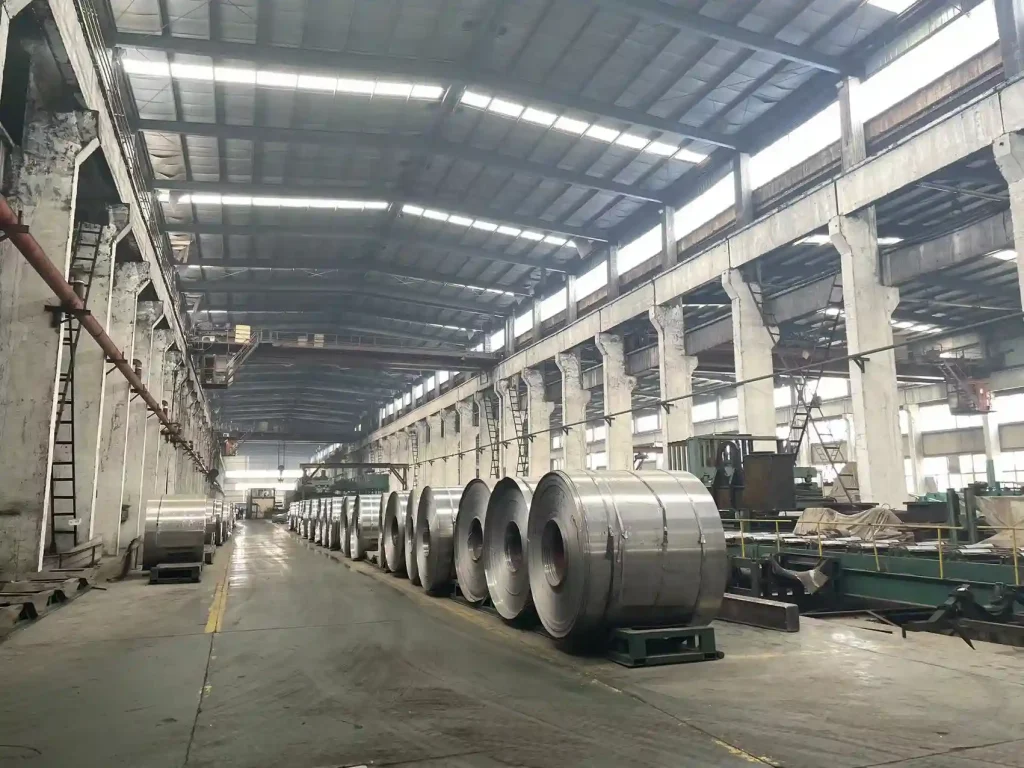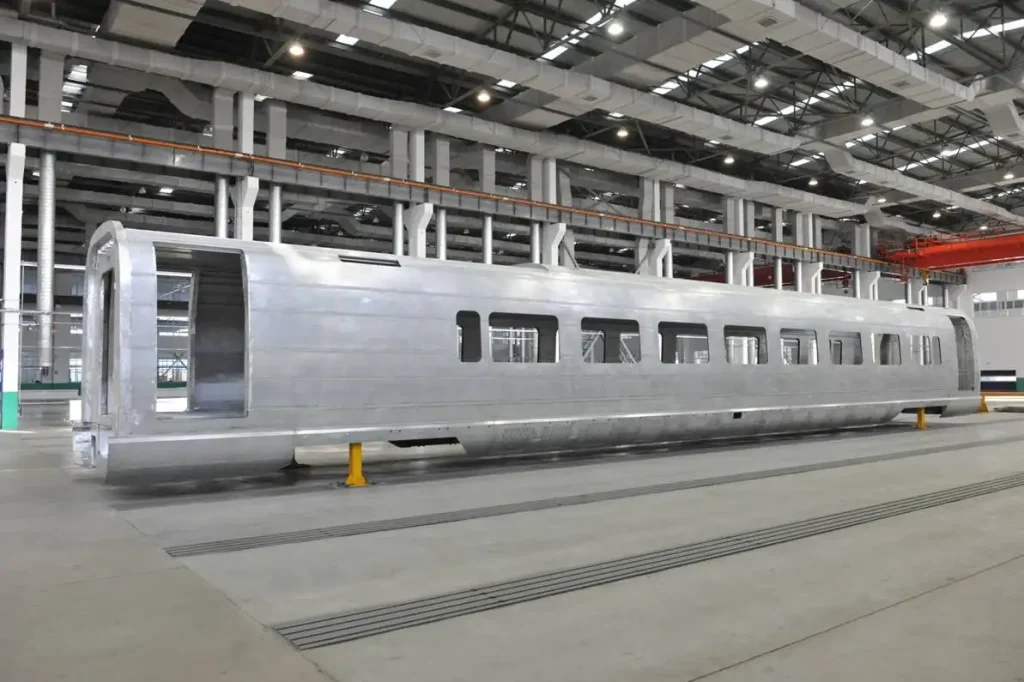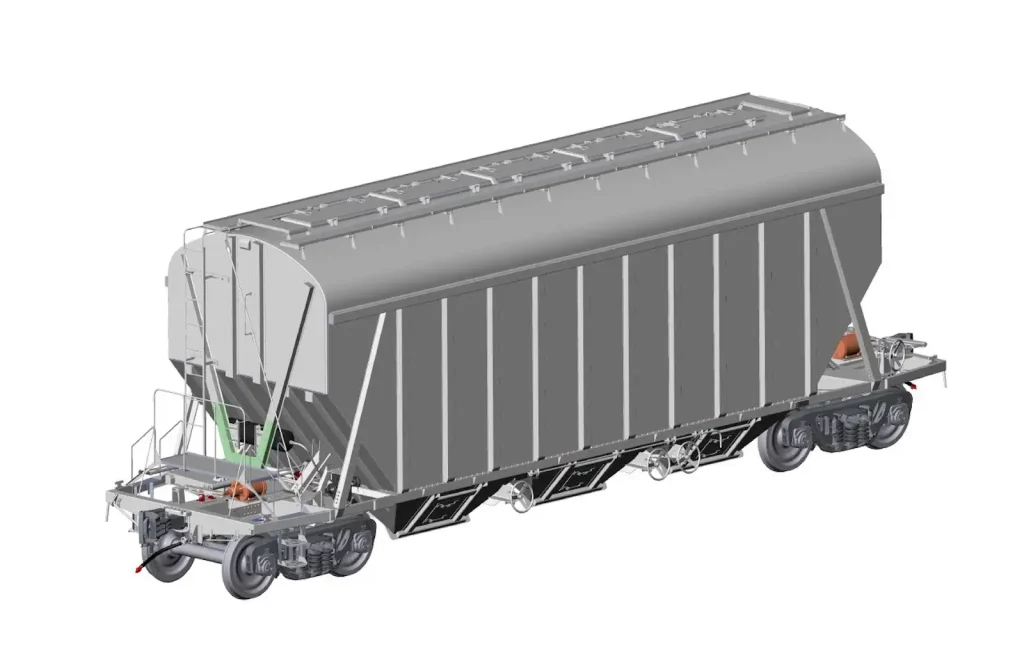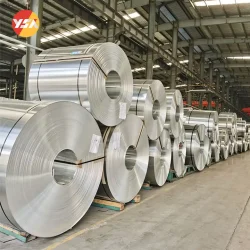Aluminum coil is widely used in the railroad industry due to its lightweight nature, resistance to rust, flat appearance, high specific strength, and the ease with which complex surfaces can be manufactured.

Aluminum Coil in Railway Industry Advantages
- Significant reduction in vehicle weight: Aluminum coil materials possess the necessary strength and rigidity to meet safety requirements, while offering a substantial reduction in vehicle weight. Typically, aluminum alloy vehicles weigh 30% to 50% less than their steel counterparts. Whether it’s a high-speed rail or a double-decker train, maximizing the aluminum content of the vehicle is the most effective way to achieve speed.
- Improved fire and arc resistance: Despite aluminum’s lower melting point (660°C) compared to steel (1530°C), the fire and arc resistance of a car body depends not only on the material’s melting point but also on its thermal conductivity. Aluminum coil has better thermal conductivity than steel, resulting in superior heat dissipation performance. This enhances the car body’s resistance to fire and arcing incidents.
- Corrosion resistance: Aluminum alloys coil are prone to produce a high-density oxide film in air, which gives them good resistance to oxidation in air. As a result, aluminum coil is more resistant to corrosion than steel, especially for parts that are difficult to paint, such as box-type structures and some internal beams and columns. Chemical coloring, painting, spraying and other treatments on aluminum alloys greatly improve the anti-rust characteristics of aluminum parts and achieve a good appearance.
- Convenient for processing, manufacturing as well as maintenance: With the development and use of large hollow and complex cross-section aluminum, aluminum welding process has been developed, and aluminum alloy automobile production technology has gradually matured. Aluminum alloy parts are easy to replace, no need for rust removal, suitable for many kinds of surface treatments, easy to maintain, and recyclable, greatly simplifying the production process, and compared to steel car body saves a lot of production time.
- Increased price-performance ratio: Although aluminum comes with a higher price tag, its utilization in aluminum alloys can significantly reduce the weight of a car. This reduction not only leads to lower energy consumption but also improves the vehicle’s transportation capacity. What’s more, aluminum’s low maintenance costs further owing to its fantastic price-performance ratio.

Aluminum Coil in Railway Industry Applications
Aluminum coil finds extensive application in both freight and passenger trains. In freight trains, the lightweight nature of aluminum allows for the transportation of larger payloads. A notable innovation in the industry involves using internally-stiffened, hollow extrusions for the movable side walls of freight cars. These aluminum walls can be manufactured with fewer components compared to steel walls, resulting in easier production, reduced weight, and enabling a single worker to handle them, thereby reducing labor needs.
For passenger cars, it is common to manufacture them using single aluminum extrusions that span the entire length of the car, sometimes reaching up to 75 feet. The individual parts are welded together and reinforced with horizontal members around the doors and windows. This simplified assembly process, requiring fewer parts, makes aluminum manufacturing more efficient than steel. The end result is a lighter, more cost-effective, and aerodynamically superior product.
The versatility of aluminum has also enabled train manufacturers to meet the evolving demands of the industry. Many trains are now designed to tilt, allowing them to lean into curves and achieve higher speeds. Furthermore, industrial railway is being developed to generate electricity during braking, and aluminum technology enables the achievement of extremely low axle weight without compromising structural integrity or safety. Additionally, considerations such as sustainability and environmental protection are increasingly important, and the use of aluminum alloys enables manufacturers to better address these needs.

Specific Applications of Aluminum Coil in Trains

Manufacturing Train Components
Various train components, including doors, windows, and HVAC systems, benefit from the utilization of aluminum coils. The manufacturing requirements for aluminum coils used in train parts necessitate high precision, consistency, and dimensional stability. These qualities ensure proper functionality and compatibility with other components within the train system.

Manufacturing Train Components
Various train components, including doors, windows, and HVAC systems, benefit from the utilization of aluminum coils. The manufacturing requirements for aluminum coils used in train parts necessitate high precision, consistency, and dimensional stability. These qualities ensure proper functionality and compatibility with other components within the train system.

Manufacturing Train Components
Various train components, including doors, windows, and HVAC systems, benefit from the utilization of aluminum coils. The manufacturing requirements for aluminum coils used in train parts necessitate high precision, consistency, and dimensional stability. These qualities ensure proper functionality and compatibility with other components within the train system.

Manufacturing Train Components
Various train components, including doors, windows, and HVAC systems, benefit from the utilization of aluminum coils. The manufacturing requirements for aluminum coils used in train parts necessitate high precision, consistency, and dimensional stability. These qualities ensure proper functionality and compatibility with other components within the train system.
Common Aluminum Alloys in Industrial Railway
The desired properties in aluminum alloys include lightweightness, ease of fabrication, mechanical strength, weldability, corrosion resistance, and response to heat treatment. The 5000 and 6000 families of alloys are particularly well-suited to meet these requirements. Commonly used sheet metals include 5052, 5083, 5086, 5454, and 6061. For extrusion purposes, widespread choices are 5083, 6061, and 7005. When it comes to welding, filler alloys such as 5356 or 5556 are commonly used.
Even in advanced high-speed trains, the aforementioned alloys, along with the 7075 alloy commonly found in the aerospace industry, are utilized. Due to the extensive range of available alloys, aluminum can effectively address the various challenges posed by the industrial railway.

